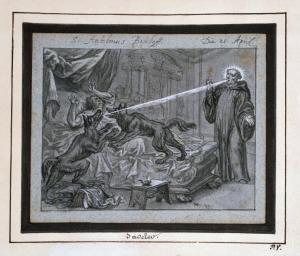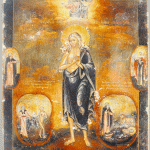
One of the greatest spiritual problems is prelest that is, spiritual delusion, which can manifest itself in a general way, but also in many specific ways. Nonetheless, what fuels it the most is pride. It is pride which allows us to think so greatly of ourselves we believe our own delusions. It is pride which leads us to not question ourselves. Nonetheless, prelest is a common problem with all of us; indeed, at one level, prelest is a general condition of all humanity insofar as we find ourselves ignorant and yet try to construct theological systems and ideologies connected in and with that ignorance in order to establish something not only for us to follow but to push upon others. And thus, with those bad assumptions, we are led to bad praxis, to do things harmful to ourselves and to others. On another level, prelest lies in the way we misconstrue our own experiences in life, reading more into them than they merit, making us think they prove our own greatness. If we discern anything mystical or spiritual in our lives, instead of questioning them, or our interpretation of them, we quickly promote the as signs which prove how important we are for the world. Then we begin to confuse more and more things, such as dreams, as being spiritual revelations, coming to us directly from God, telling us things which not only we should know, but things which we should proclaim to others, warning them if they do not heed our warnings, they will suffer greatly for rejecting us and what we have to tell them. Prelest, therefore, relies upon vainglory and pride, using them to make us not question ourselves and our interpretations of what we assume to be signs and wonders which prove our greatness and the veracity of whatever it is we think we know.
Because prelest is about spiritual delusion, that means, much, if not all, we interpret as being signs given to us by God are not; they are either from our own confused mind, such as happens with dreams, our mind’s misunderstanding of our perceptions, such as happens with mirages, or some outside influence or power manipulating us, “demonic powers” or systematic structures of sin which infiltrate our mind and shape our thoughts. Prelest, therefore, is dangerous because it prevents us form seeking after and engaging the greater truth; it makes us narrow ourselves down upon ourselves, and what we think we have learned and experienced, absolutizing error after error. And if the influence comes from “demonic powers” or systematic structures of sin, they ultimately make us act in ways contrary to the truth while making us believe what we are doing is right and just. There are all kinds of stories available to us which shows the dangerous of prelest, for example, of people who believe themselves to be prophets, specially chosen by God, people who believe they have been given special visions or locutions by God, angels, or other saints, who are led to do, or try to do, some great evil. That is, we can find horrifying tales of people who are led to kill (or try to kill) members of their own family, such as one we find St. John Cassian heard from Abba Moses in The Conferences:
And what should I say about the man who, while welcoming a demon in the guise of angelic brightness over a long period of time, was often deceived by his innumerable revelations and believed that he was a messenger of righteousness? (I do not want to mention his name because he is still alive). When these revelations were being received, his light took the place of a lamp in the man’s cell every night. At last he was ordered by the demon to offer to God his own son, who was living with him in the monastery, so that by his sacrifice he might equal the dignity of the patriarch Abraham. So taken in was he by this idea that he would have committed the murder except that his son, seeing him sharpening his knife with unaccustomed care and looking for the bonds with which he was going to tie him up for the sacrifice when he made an oblation of him, fled away terrified, having a premonition of the coming crime. [1]
Thankfully, that monk’s son was able to get away, but we have heard many examples of people who have killed their family, and often themselves, thinking they were told to do so by God. They had no discretion. They had no one to lead them away from their delusion. And while we should not just follow along with society and do whatever it should tell us to do, as society is shaped by all kinds of systematic structures of sin, we should find people we can trust, people who can help us, so that if we begin to be led astray by some sort of delusion, no matter the source, we can be stopped before we act rashly and needlessly do something harmful to ourselves or to someone else.
We need each other. We need help from each other. We need people who can help us make good judgment calls so we won’t be fooled – it is pride (or fear) which makes us think we can do it all by ourselves. And, with religious people, it is often pride in what they have done, in all the good works they have done, which lets them become so foolish, to become deluded, that they think they cannot be led astray. For pride makes us think that our works have made us so great that all that we will experience, all the thoughts will have, will be good and wholesome. St. Antony, therefore, pointed out the need, not only for discretion, but for spiritual guides, people who have likewise faced similar challenges so they can and will see them for what they are:
And when they had thus determined that more certain access to God could be obtained by different virtues and the greater part of the night had been taken up with this question, blessed Antony finally spoke: ‘All these things that you have mentioned are indeed necessary and useful for those who thirst for God and who desire to come to him. But the innumerable falls and experiences of many people do not at all permit us to attribute the highest grace to these things. For we often see that those who keep fasts and vigils most rigorously and who life far off in the solitude in wondrous fashion, who also deprive themselves of any belongings to such an extent that they do not much as along a single day’s food or one denarius to be left over, and who even fulfill the demands of hospitality with the utmost devotion, are so suddenly deceived that they are unable to bring to a satisfactory conclusion the work that they have begun, and they cap off the highest fervor and a praiseworthy way of life with a disreputable end. Therefore we would be able to know clearly what was the best way to come to God if we carefully sought out the reason for the ruin and deception of such people. For although the works of the aforesaid virtues abounded in them, the lack of discretion by itself did not permit those works to endure to the end. Nor can another reason be found for their fall, except that they were less well instructed by the elders and were utterly unable to grasp the meaning of discretion, which avoids excess of any kind and teaches the monk always to proceed along the royal road and does not let him be inflated by virtues on the right and – that is, in an excess of fervor to exceed the measure of a justifiable moderation by a foolish presumption – nor let him wander off to the vices on the left hand because of a weakness for pleasure – that is, under the pretext of controlling the body, to grow soft because of a contrary lukewarmness of spirit. [2]
It is vital we fight against prelest, spiritual delusion, and key to doing so is humility. For we will not be so easily led astray and think we can do no wrong if we cast away our pride. While we are on our spiritual journey, we must not be so concerned about spiritual visions or being seen as great spiritual leaders. Instead, we should cast all interest in such aside, for then we will not leave ourselves open to such delusion. “If we cannot yet cleave to eternity, at least let us drive away our phantasms, and cast out of our mental vision trifling and deceptive games. Let us use the steps which divine providence has deigned to make for us.”[3] This is not to say we should abandon spirituality altogether, but it means, when we engage it, we must do so humbly; we must not allow ourselves to be detoured and think something we experience is necessarily a sign or a vision from God. We must be cautious. We must keep ourselves sane. And, again, being in a community, having a good relationship with people we can trust, will help us. But if we find ourselves in a situation where we don’t have such a community, because of the way society has abused us, we still need to be cautious and be ready to cast doubt on all such experiences, visions, or the like which we have, making sure we follow the simple path instead of being led to believe ourselves to be great. For, while the lives of the saints show such experiences are possible, they show, moreover, that what is important is not those experiences, but humility:
Brother, never be deceived, therefore, by such demonic assurance. For divine visions certainly occur to the saints, but they are always preceded by calm, peace, and joy in their hearts. Indeed, the saints are always aware of the truth and regard themselves as being unworthy [of such visions]. How much more, then, should sinners never believe these visions, when they are aware of their unworthiness?[4]
When what we experience would makes us ignore or doubt the need for such humility, we know we have been led astray. And it is such pride which, left unchecked, will lead us to doing, or trying to do, great evil, like killing loved ones. Thus, we must admit we do not know it all, that we continue to be on a journey towards the realization of greater truth and righteousness, allowing ourselves to question ourselves every step of the way, so that we will not let our pride convince us to do what we otherwise would never do.
[1] John Cassian, The Conferences. Trans. Boniface Ramsey, OP (New York: Newman Press, 1997), 89. [Second Conference; Abba Moses].
[2] John Cassian, The Conferences, 84-5. [Second Conference; Abba Moses].
[3] St. Augustine, “Of True Religion,” in Augustine: Earlier Writings. trans. John H.S. Burleigh (Philadelphia: The Westminster Press, 1953), 275.
[4] Barsanuphius and John, Letters, Volume 2. trans. John Chryssavgis (Washington, DC: The Catholic University of America Press, 2007),102
Stay in touch! Like A Little Bit of Nothing on Facebook.
If you liked what you read, please consider sharing it with your friends and family!
N.B.: While I read comments to moderate them, I rarely respond to them. If I don’t respond to your comment directly, don’t assume I am unthankful for it. I appreciate it. But I want readers to feel free to ask questions, and hopefully, dialogue with each other. I have shared what I wanted to say, though some responses will get a brief reply by me, or, if I find it interesting and something I can engage fully, as the foundation for another post. I have had many posts inspired or improved upon thanks to my readers.













